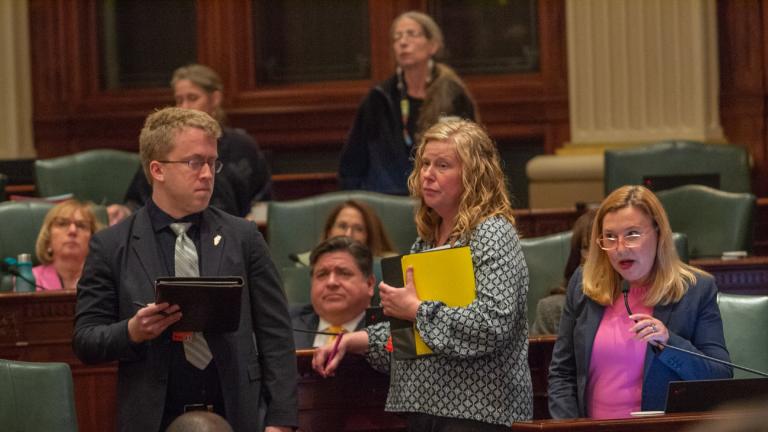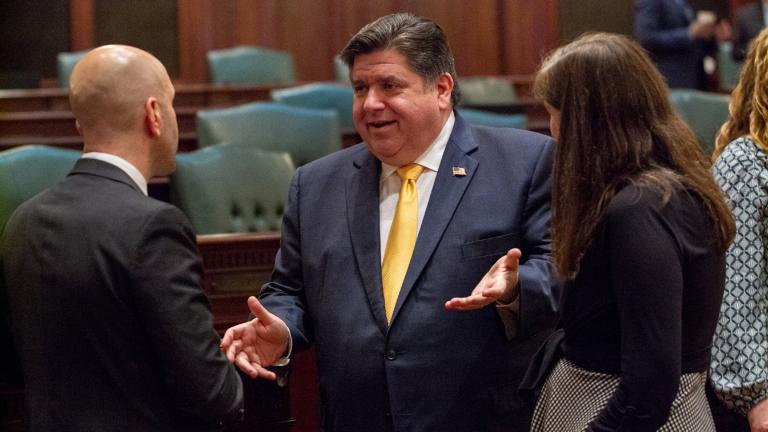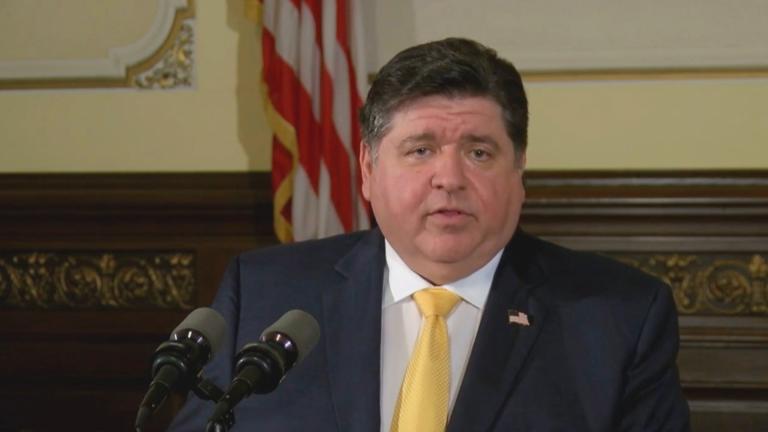Video: State Sen. Chapin Rose (R-Mahomet), Sen. Cristina Castro (D-Elgin), Rep. Avery Bourne (R-Litchfield) and Rep. Kam Buckner (D-Chicago) weigh in on Gov. J.B. Pritzker’s proposed $41.6 billion budget on “Chicago Tonight.” (Produced by Quinn Myers)
Illinois voters rejected moving to a graduated income tax structure in November, prompting Gov. J.B. Pritzker to warn of deep and painful cuts, or a hefty flat hike in the income tax.
The pandemic-era budget the Democrat proposed Wednesday contains neither, and instead relies heavily on businesses to bring an additional $932 million into state coffers through what Pritzker describes as closing corporate tax loopholes.
“We live in a challenging moment in so many ways, not the least of which are the choices that must be made to balance our state budget in the midst of economic hardship for everyday Illinoisans,” he said.
Republicans describe the “loopholes” as job-creating tax incentives, the elimination of which is tantamount to a tax increase when unemployment is at a peak – potentially, some suspect, a tactic rooted in revenge for business’ and the GOP’s role in defeating the graduated income tax constitutional amendment.
“We understand that the state has fiscal problems to address, however, the governor’s plan will have a long-term negative impact on job creation and tax revenues for the state as it produces an unfair increase on taxpayers after they resoundingly defeated the graduated income tax. This not only will expand what will get taxed, but will also reduce key tax credits for vital sectors of the economy,” Illinois Chamber of Commerce CEO Todd Maisch said.
"We know the administration faces a tough fiscal task,” he continued. “However, these tax increase proposals will only paper over our short-term problems, but accelerate Illinois’ long-term economic crisis. In particular of the many problems in the governor’s proposals, a particular concern is the elimination of the single sales factor in assessing Illinois income tax. This misguided proposal has the impact of increasing taxes on Illinois based businesses at a time we can least afford it.”
Interest groups usually allied with Pritzker praised his looking to business to bolster spending, but aren’t satisfied, and are calling on him to find additional revenue sources so there’s more money for “schools, health care, public safety, help for the unemployed, for children and seniors, people with disabilities and more.”
The “We are One” unions coalition said that’s partially the responsibility of Congress but “further action from Springfield may be needed, as well. As the budget process goes forward, we will work with legislators and the governor to identify revenue-raising measures that can prevent harmful cuts and strengthen our state.”
Likewise, Jeremy Rosen of the Responsible Budget Coalition – another major backer of Pritzker’s graduated income tax – said that “since March of last year, Illinois has seen more than 20,000 people die from COVID-19, record levels of unemployment, dramatic increases in food insecurity, and an explosion of our state’s affordable housing crisis. Black and Latinx people have been disproportionately impacted by sickness, death, and economic hardship. At a time like this, the State of Illinois needs a budget that makes bold investments to mitigate the impacts of the pandemic. Unfortunately, the governor’s proposed budget simply does not meet this moment.”
The governor’s $46 billion spending proposal largely keeps spending flat for the fiscal year 2022 budget that begins in July, even as it puts the $900 million extra required by law into the state’s underfunded pension systems.
The plan does so in part by relying on federal funding, but it does not bank on the $7.5 billion more that could come through should Washington approve President Joe Biden’s coronavirus relief package for states.
Still, Senate Republican Leader Dan McConchie said the budget relies on $1.7 billion in hypothetical revenue that the legislature may never approve.
“By skipping out on the hard work of reform, he is continuing to punt on those fundamental changes so necessary to put Illinois on a stable financial path,” McConchie said. “This continues to show just how out of touch he is with how Illinois families live and operate. It is my sincere hope that the governor will rethink this proposal and work with the legislature to come up with a plan that will actually move our state forward.”
Due to the coronavirus, the governor taped his presentation from a COVID-19 vaccination site at the Illinois State Fairgrounds in Springfield, where a makeshift hospital was set up during the 1918 Spanish flu, instead of from the Illinois House chambers before a joint session of the General Assembly.
“Everything old always seems to become new again, and despite all we’ve learned and discovered about medicine and science in a hundred years, fighting a raging pandemic successfully continues to rely on the selflessness and sacrifice of our citizens. Just as our predecessors did a century ago, we’ve had to shutter businesses, cancel public gatherings, close schools and theaters and restaurants and ask our citizens to wear masks and limit human contact,” he said. “All of this was in the pursuit of one goal and one goal only – saving as many lives as possible.”
Pritzker spent much of the address defending his response to the pandemic, and taking “far right” Republicans to task for undermining him.
“Amidst the tragedy of this pandemic, they have lobbied against the federal government providing relief to Illinoisans, ignoring the life-changing economic pain of real working families. In essence, they eliminated the fire department, burnt down the house, and poured gas on the flames — and now they’re asking why we’re not doing more to prevent fires,” he said. “In a normal year, I might have more patience for their hypocrisy. But this is not a normal year.”
He went on to admonish Republicans for not contributing ideas for closing the $3 billion deficit; Republicans say Pritzker has long refused to work with them, and that he’s further breaking their trust by moving to rescind the corporate tax breaks agreed to in a bipartisan 2019 deal.
Despite the partisan swiping, Republicans votes are not needed to pass a spending plan – Democrats hold super-majorities in both chambers of the legislature.
The response from members of Pritzker’s party walked the line between positive and muted, with many Democrats describing the proposal as a starting point.
“This proposal is a good-faith effort by the governor to both recognize our state’s financial realities and honor our commitments and priorities,” Senate President Don Harmon said in a statement. “Senate Democrats, however, are always interested in finding resources for education. I suspect this year will be no different.”
For the second year, Pritzker proposes to skip giving a $350 million boost to schools as called for in a 2017 law intended to slowly but surely put Illinois’ neediest school districts on par with the wealthy ones buttressed by local property taxes.
“I understand this is a difficult budget year because of the pandemic, but our kids and teachers in low-income communities cannot and should not have to wait forever to see the funding increases they were promised,” State Sen. Kim Lightford, D-Maywood, said in a statement.
Instead, Pritzker relies on $2.8 billion from the federal government intended for schools.
“Thanks to this funding, we can protect our K-12 investments at current spending levels. No schools will have to reduce spending, and they can instead focus on meeting the needs of students who have tried to learn in a chaotic and trying time,” Pritzker said. “I call on school districts across the state to use those additional funds to follow the Biden plan for restoring safe in-person learning.”
Pritzker’s proposal also seeks to reduce from 75% to 40% the tax credit donors can claim for giving to a state scholarship fund that low-income families can draw on to pay for tuition at private schools.
The address also doubled as the annual state of the state address; the governor didn’t elaborate, but he said his lengthy “to do list … includes key priorities like finally authorizing the overdue second cannabis licensing lottery, and passing an energy bill that protects our nuclear fleet and builds up our wind and solar industries, protects the environment, puts consumers first and supports jobs.”
He also called on the legislature to take action on ethics.
Even as corruption scandals swirled in the statehouse, ethics proposals like a ban on lawmakers holding dual roles as lobbyists or requiring disclosure of conflicts of interest, have stagnated.
Follow Amanda Vinicky on Twitter: @AmandaVinicky








